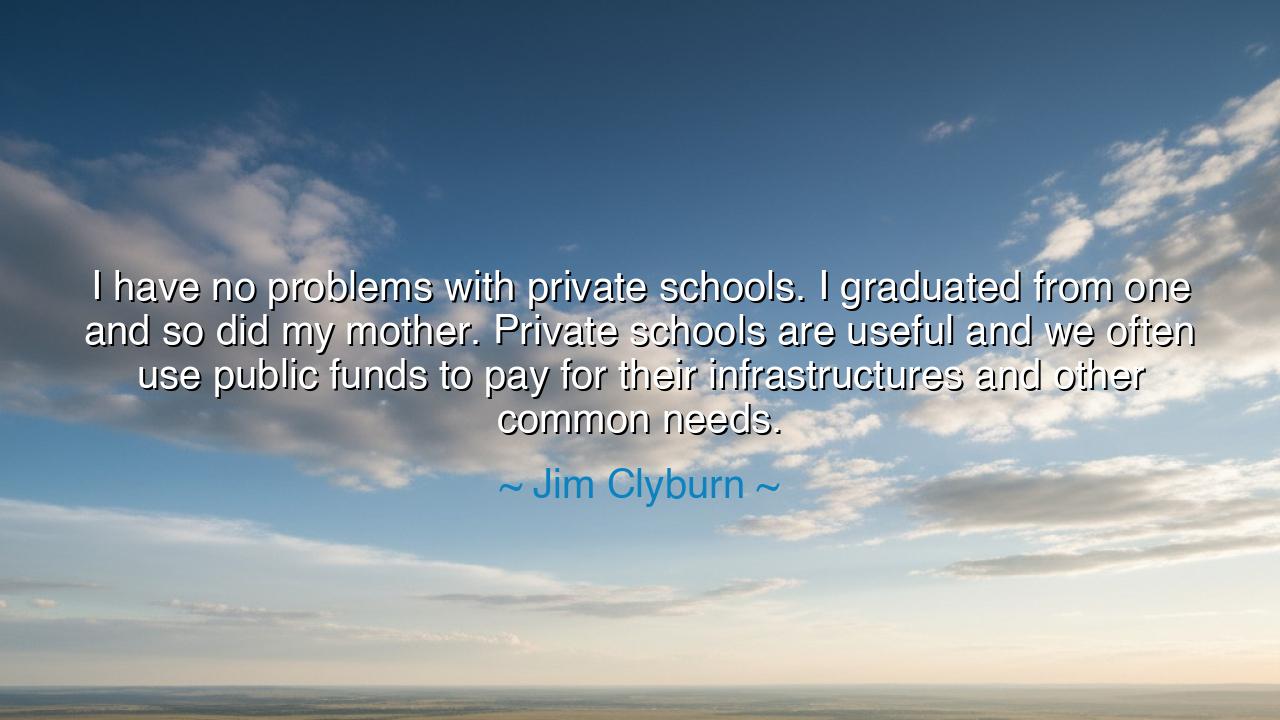
I have no problems with private schools. I graduated from one and
I have no problems with private schools. I graduated from one and so did my mother. Private schools are useful and we often use public funds to pay for their infrastructures and other common needs.






The words of Jim Clyburn — “I have no problems with private schools. I graduated from one and so did my mother. Private schools are useful and we often use public funds to pay for their infrastructures and other common needs.” — carry a tone of balance, wisdom, and civic understanding. They are not the words of division, but of harmony. In them we hear the voice of a statesman who has seen both sides of society — the public and the private, the privileged and the striving — and who understands that the true strength of a nation lies not in its separations, but in its shared responsibility. Beneath his calm statement lies an ancient truth: that education, in whatever form it takes, is sacred, and that the wellbeing of one system depends upon the health of all.
When Clyburn speaks of private schools with respect, he speaks as one who has known their discipline and opportunity. He does not deny their usefulness, nor does he worship them. He sees them as part of a greater whole — threads in the vast fabric of the nation’s education. His acknowledgment that both he and his mother graduated from private schools reminds us that education, regardless of its form, is a bridge between generations. The mother and son, each lifted by learning, symbolize the timeless chain by which knowledge preserves the dignity and progress of a people. Yet, in his next breath, he reminds us of something deeper: that even the private institution stands upon the foundation of public support — roads, safety, law, and often, funding for infrastructure and shared needs. Thus, he points to an eternal principle: no part of society stands alone.
From the beginning of civilization, the wise have taught that the common good sustains all things. In the cities of ancient Greece, the philosophers understood that private virtue must serve public harmony. Aristotle, in his teaching, said that “the good of man and the good of the state are one.” So too does Clyburn’s statement reflect this philosophy — that public and private, though different in form, are bound by mutual dependence. Private schools may nurture excellence and individuality, but they thrive only within a society whose public institutions uphold justice, order, and opportunity. To scorn the public while enjoying the private is to forget that the tree draws strength from the soil it shares with others.
There is also humility in Clyburn’s words — the humility of one who knows that gratitude must accompany privilege. He reminds us that to receive from the community is to owe it service in return. Even the most self-sufficient school, the grandest academy, depends upon the silent labor of the many — the taxpayer, the worker, the builder of roads, the keeper of laws. Thus, when he says that “we often use public funds to pay for their infrastructures and other common needs,” he calls for awareness and fairness. His voice is that of the elder statesman, urging his listeners not toward rivalry, but toward recognition — recognition that progress is shared, and that wisdom lies in gratitude, not in pride.
We can find echoes of this truth in history. Booker T. Washington, born into bondage and rising through education to leadership, once said that “no race can prosper till it learns that there is as much dignity in tilling a field as in writing a poem.” He too understood that the greatness of a society lies not in the separation of the privileged from the humble, but in their interdependence. Private schools, public schools — both are sanctuaries of learning, but both are also nourished by the same wellspring: the faith of a people in the power of knowledge.
The deeper wisdom here is that education is not a competition but a covenant. Whether public or private, its purpose is not to exalt a few, but to enlighten all. The ancients taught that knowledge was the flame passed from torch to torch — that one light must ignite another. If one flame burns brighter, it is not to overshadow, but to illuminate the way for others. When Clyburn acknowledges the role of public funds in sustaining private institutions, he reminds us that every scholar, every teacher, every institution owes something to the society that makes their work possible. To forget this is to let arrogance poison wisdom; to remember it is to honor the sacred balance of the world.
And so, the lesson, O listener, is this: cherish the gift of learning, and honor the hands that make it possible. Do not pit the public against the private, nor the individual against the community. Remember that greatness grows from gratitude, and strength from cooperation. If you are given privilege, use it not to separate yourself, but to lift others. Support the schools that serve all children, for from them will come the leaders, builders, and dreamers of tomorrow.
For in the end, the teaching of Jim Clyburn is not about schools alone — it is about the unity of a people. Just as the educated man stands upon the shoulders of his teachers, so too do the private institutions stand upon the shoulders of the public. Let none forget that their fates are bound together. For a nation that forgets its common roots will one day find its highest towers crumbling into dust, while one that honors its shared foundations will rise, enduring, generation after generation, in wisdom, gratitude, and light.






AAdministratorAdministrator
Welcome, honored guests. Please leave a comment, we will respond soon